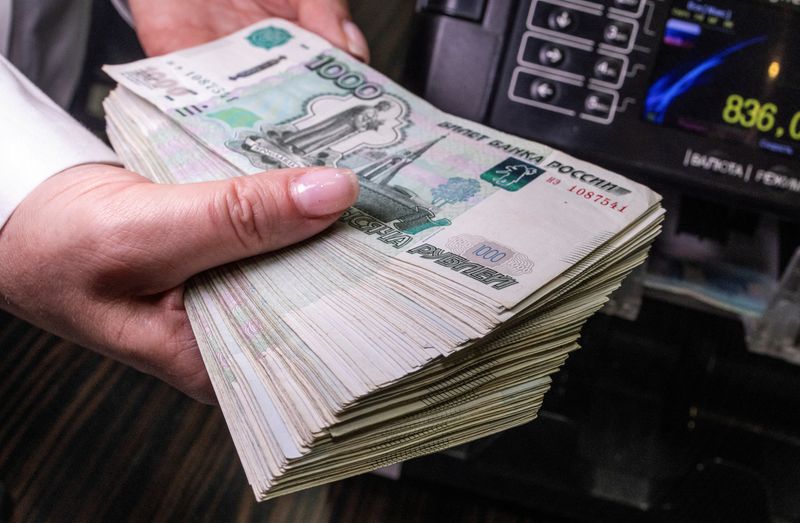By Alexander Marrow
(Reuters) - The Bank of Russia is likely to hold its key rate at 16% in February after five rate hikes in a row, as inflation pressure shows signs of easing, a Reuters poll suggested on Thursday.
Double-digit interest rates are set to slow Russia's economic growth this year. The economy contracted in 2022 as Moscow bore the brunt of sanctions in the wake of its invasion of Ukraine, but rebounded in 2023 as Western efforts to starve Russia of energy revenues proved fairly ineffective.
Thirteen analysts and economists polled by Reuters expect the central bank to hold rates at its first meeting of the year on Feb. 16. Stubbornly high inflation, exacerbated by rouble weakness, high budget spending and labour shortages led the bank to hike rates by 850 basis points in the second half of last year.
Mikhail Vasilyev, chief analyst at Sovcombank, said the central bank was likely to give a neutral signal.
"We believe that the opportunity for lowering the key rate will open up only in the middle of the year (June or July), when inflation starts to slow down steadily," he said.
Inflation, which the central bank targets at 4%, is seen ending this year at 5.2%. That would follow annual inflation rates of 7.4% rate in 2023 and 11.9% in 2022.
Inflation data in recent weeks has lowered the probability of another rate hike, CentroCreditBank economist Yevgeny Suvorov said.
"But we do not rule out another increase, especially if the situation with exports continues to worsen and the exchange rate heads towards 100 (per dollar)," Suvorov said. "In this case, the central bank would have to move the rate to 18-19%."
Rouble weakness fuelled inflation in 2023. Analysts expect the rouble, currently trading at about 90 per dollar, to weaken to 93.5 over the next year, an improvement on the prediction in the previous poll.
The rouble may strengthen in the short term to 87 per dollar, Vasilyev said.

"The rouble is favoured by seasonally lower demand for foreign currency at the start of the year, mandatory foreign currency revenue sales for major exporters, high rouble interest rates and yuan sales from reserves as part of budgetary operations," he said.
Russia's gross domestic product is expected to grow 1.7% this year, the poll showed, slowing from a rebound of around 3.5% in 2023 and still supported by hefty military spending.
(Reporting and polling by Alexander Marrow; Editing by Andrew Heavens)